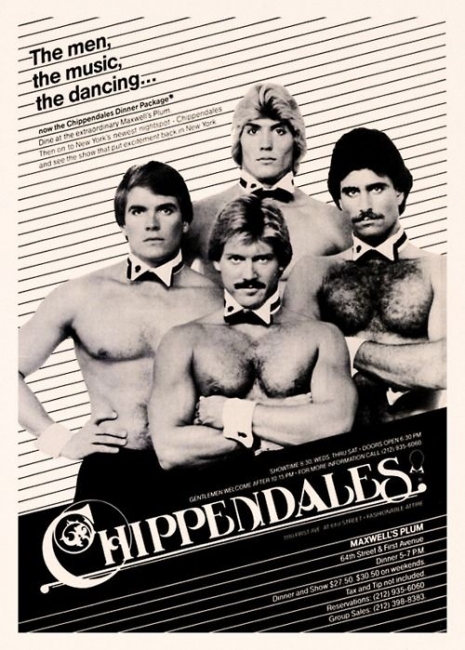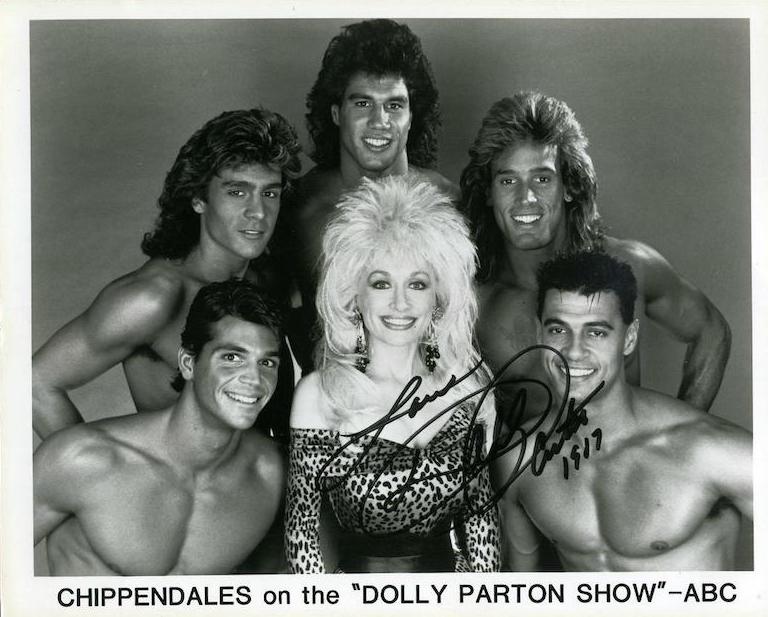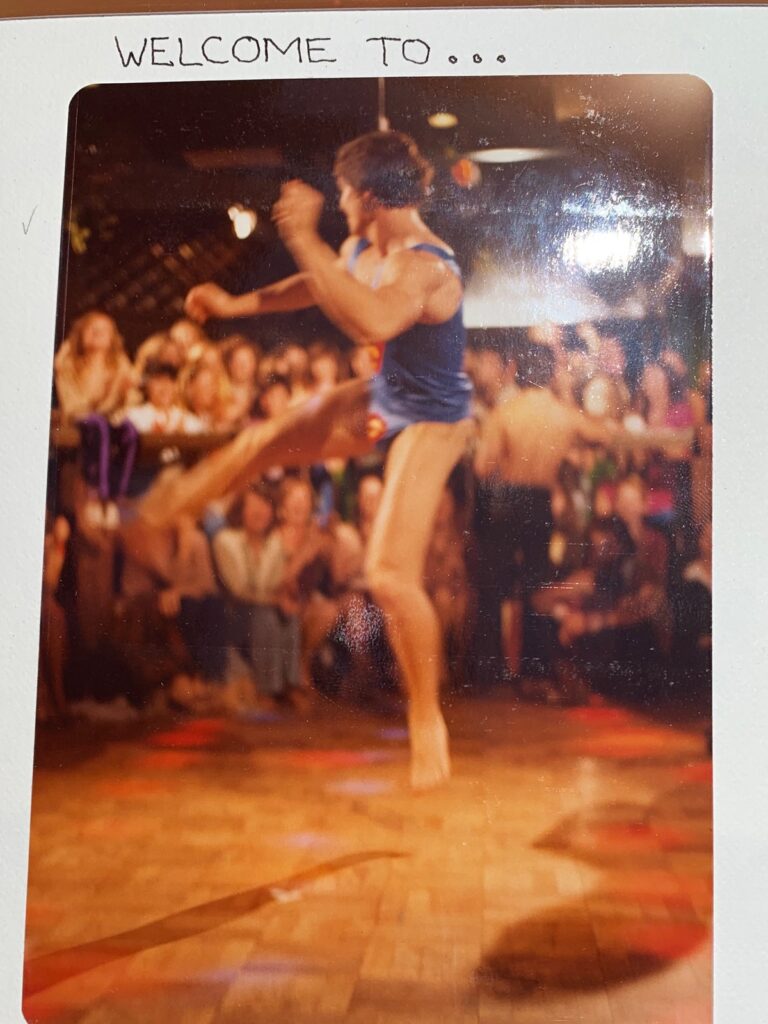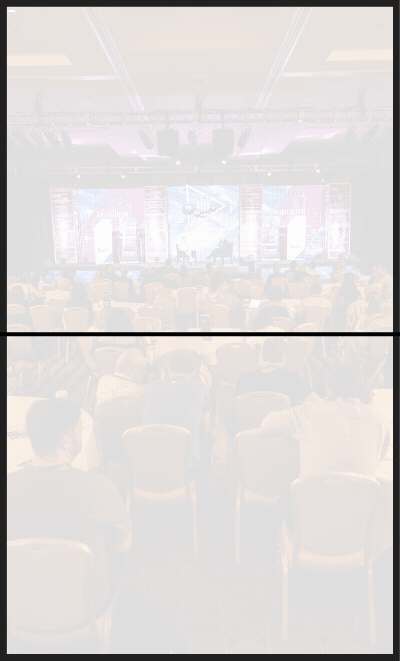Dr. Natalia Mehlman Petrzela is a historian of contemporary American politics and culture and the host of the podcast Welcome to Your Fantasy. If you haven’t heard it, add it to today’s to-do list — and be sure to put in headphones, because things get saucy.
The series dives into the dark and sordid history of Chippendales, the male exotic dancing phenomenon that cemented itself in 1980s pop culture. As easy as it may be to stereotype the men who worked there (and the women who visited), Natalia’s deliberate practice of showing the human side of the stories meld the worlds of journalism, oral history, and entertainment into one incredible…well, package.
Portions of this interview have been edited for clarity and content.

Doug

How long did Welcome to Your Fantasy spend in production?
Natalia
Great question, and a more complicated one than you might think. We started researching the show in March 2019. So all in all, almost two years. We took two trips to Los Angeles, and we were out on the street interviewing people who were around the original Chippendales club. And then we went to homes of various folks who lived in Los Angeles who are also part of this story.
Doug
That's quite a timeline. Was it a luxury to have so much time to make the show?
Natalia
Yes and no. The show was first slated to be released March 17th of 2020, before the pandemic even happened. There was a lot of ground to cover — 40 years or so of history. And we do it in this thickly researched, archivally dense way. So that felt like we were working hard. It wasn't my full-time job because I'm a professor too, but we were hustling, then the pandemic happened and we put it off until August.
We ended up not only improving what we'd already done, but landing interviews with folks that we hadn't gotten to speak to before.
Then Spotify and Gimlet got involved a week before we were supposed to release. We then had the benefit of these new editorial insights. And actually, in that timeframe, we ended up not only improving what we'd already done, but landing interviews with folks that we hadn't gotten to speak to before.
When delays came, we were like, oh no, but then with each delay came the benefit of more editorial insight, and even more access to sources. So in that way, it did feel like a luxury.

Doug
How would you describe the show prior to Spotify and Gimlet’s involvement? What did that version of the show look like?
Natalia

I don't think the show was so fundamentally different. It was always going to be a narrative podcast about the Chippendales phenomenon as a lens on American culture and politics and society. But in particular, there are two folks who play big roles in the version now, in the final version, that were not in it before. And one of them listeners will already have met if they've been keeping up with the episodes. That is a man named Scott Marlowe, who is a very colorful character and was a really big star of the Chippendales in its New York years.
And then there's another man who I'll be a little cagey about because that episode hasn't dropped yet. But he's a major figure in law enforcement, who our associate producer, Christine Driscoll, was bugging for like a year, texting him and bothering him. And then finally he relented, and he gave a phenomenal interview, which adds such a layer of depth to this manhunt that happens later on in the series. I feel like the international chase comes alive thanks to him sharing his story.
Doug
Was there something in particular that pushed him over the edge and caused him to say yes? Or was it just a matter of knock, knock, knock?
A lot of this kind of work is just being really dogged.
Natalia
I think it was persistence. A lot of this kind of work is just being really dogged, and looking through all the archives and calling those interviewees, not to be a stalker, but to be persistent about it. I'm not sure exactly what changed in his life. I venture to say that for a lot of people, the pandemic has been extraordinarily stressful, but also has opened up some dead time for some folks. Maybe he felt like he had some time to share with us. And he was very generous with his time.
Doug
In terms of production, was the whole series in the can when the first episode was released? Or are you still in editing?

Natalia
No, we're done. So eight episodes were finished. And also, as with any show that has a high profile like this, people are coming out of the woodwork. So they are all these folks like, “Oh, I was the code chef girl at Chippendales in New York.” “I worked in the costuming room.” “I walked Nick De Noia’s dogs.”
You never know what might lie in the future, because enthusiasm seems pretty high about the show.
So we’ve wrapped our eight episodes, but we're kind of seeing what's coming in. And you never know what might lie in the future, because enthusiasm seems pretty high about the show.
Doug
I can’t wait to hear all of these random stories and how you’ll stitch them together. I imagine there are so many narrative threads, you could pull this one for a season, that one for another, and make this an ongoing series.
Natalia

Maybe, you never know. Like with any show, there's so much that was on the cutting room floor. So many wonderful stories we didn't get to include, both with the folks who are on the show, who had many stories in their rich lives, which were not included, but also from some folks whose voices didn't make it in there. So certainly, there's more to the story.
Are we doing justice to present these folks as full people? Are we painting them not as caricatures, especially on a topic like this?
That being said, we went through so much drafting and so much editing and so much thinking about, are we doing justice to present these folks as full people? Are we painting them not as caricatures, especially on a topic like this? I mean, what's the easy thing to say about these men in particular? Oh, they're just these hunky sex machines, and you know that they partied all the time.
Are we pushing back on that and giving the whole picture? Are the women more than just horny, screaming bachelorettes? Part of what we're trying to do is show these people as human beings. I think for all that was left on the cutting room floor that hopefully we did well by the people involved.

Doug
Do you have any memorable cutting room floor stories you could share?
Natalia

There's one person we interviewed for a long time. His name is Scott Layne, he was a dancer in New York City. And he worked really closely with Nick De Noia. He's actually one of the few men who was in Chippendales in the 80s, who's still in the male exotic dance business. He has a company and he has his own review. But he doesn't dance anymore on stage.
I spent probably six hours with him, interviewing him at his home. I met his dad who lives next door. They had a really interesting personal story about how his work in male stripping alienated him from his father. But then when his dad kind of saw his success, it brought them back together, and he was Playgirl’s Man of the Year.
This is a person with a lot of really rich stories. The fact that he's not in there is not a reflection of his stories not being up to snuff, they absolutely were, it was just the pressure of having to move the narrative forward in relatively little time, even though I know eight episodes can sound like a lot.
Doug
How does a six-hour interview process work? Do you go in and say, Okay, we're gonna sit down for this long, and every hour or so we'll take a break?
Natalia

We usually don’t give a specific, set time for how long we’ll be there. We try to be really respectful, obviously, of everyone and few people we spend that much time with. But we ask if they’ll block the afternoon for us, and we're constantly checking in, are you okay? Do you need to take a break? And we need to take a break, too.
You hope with an interview like that, or with others, that people don't have a hard out. Often you get to talking, and they have these incredible stories, and they want to keep sharing and you want to keep listening. Everyone’s really in the moment.
Spending many hours with someone is an effort on my part to fully understand who they are.
And I will say, I'm a historian foremost before I'm a podcast host. When you do oral history, in some ways it's very different from a journalist trying to get a quote for a story that's running the next day. And in some ways, the luxury of the form is like, okay, I'm interested in you because you were a dancer at Chippendales. But actually, I want to know, like, where'd you grow up? What were you into as a little boy? What were your parents like? Were they political? And that's not being nosy or being or wasting time, it's really trying to get a sense of the world that gave them their experiences, or that shaped their experiences.
Spending many hours with someone is an effort on my part to fully understand who they are. So that even if we just get a few minutes or soundbites that make it into the show, we can be really careful and feel good about the fact that we're portraying them accurately. [We’re] setting them up in a way that's less about that great sound bite or that quote, and more about, okay, this is evocative of who this person is and where they come from. In that episode, we stopped and I was like, “Can you show me how you teach a dance routine to the guys?” And he totally taught me the choreography for that. So sometimes we have dance breaks, too.

Doug
You mentioned the journalism and oral history side of the series, and I think there’s a third piece in that puzzle, one of entertainment value. How do you balance fact-checking with these three elements?
Natalia
I wouldn't say fact-checking is another layer. But let me begin with that first tension you mentioned, that connection between oral history and entertainment for an audio podcast. When you're doing oral history, purely as a historian, your goal is to capture this person's life and stories, and to have a usable transcript, which will exist hopefully for other people to use in the future.

You are trying to remove yourself as the interviewer as much as possible from the conversation. You really just want to step back as much as possible and capture their experience. When you're doing what we were doing for a podcast like Welcome to Your Fantasy, which is also entertainment, I absolutely tried to be impartial and have that removed.
Are we pushing back on [stereotypes] and giving the whole picture? Part of what we're trying to do is show these people as human beings.
But I'm also a host. And I think some of the best moments in the show are actually the banter between me and the people that I'm interviewing and our conversations. And that was an issue that was a balance that I had to think very carefully about, and I spent a lot of time ruminating on. I knew a lot of what I bring to this project is my seriousness as a scholar and someone who's interviewed tons of people and can situate them in context.
But this is also a different kind of animal and I wanted to also show up, hopefully, as an engaging human being, an interviewer that did a good job at striking that balance. And it was interesting for me to learn that in some ways, showing up as a more fully present human rather than just an interviewer I actually think led some of these people to share more about their experiences than they might have if they felt that it was a drier interview process.
So you know, live and learn.
In terms of fact-checking, there's a very big and wonderful team that we worked with, and we had this amazing fact-checker. His name is Ben Phelan. I joked that he puts academic peer review to shame because you'd be like, “We lived in a big house.” And he’d say, “Well, I checked all the real estate listings in the area and it wasn't really big.” I mean, he was incredible. So people can rest assured that we are faithful to the record as best as humanly possible thanks to Ben Phelan.
Doug
When you're in an interview that gets personal, how do you know when to press for more information versus letting off the gas?
Natalia

Before going into any interview, I've done a lot of research before and I know where we are in the show. So I have a sense of the kind of topics and the kind of stuff we want to get. So when you start hearing someone talk about the themes that you're most interested in, or you think you're most interested in, you want to kind of push that by asking people how something made them feel.
That's something I learned in making this show, which you almost never do as an academic historian. Eleanor Kagan, our producer, would say, “How'd you feel? What did you do next?” Very basic questions. But they're questions that keep people in the moment and help them share more.
In some episodes, we talked about some really heavy topics and got into some dark themes. I had these men crying in front of me and sometimes, and I would try to acknowledge the intensity of what they were feeling. And, you know, acknowledge, like, ‘Yeah, I know, it's really hard to talk about this,’ and not push in a way that felt, exploitive or disingenuous, but let them take time for themselves. And also realize I don't want to force them to say anything. So to kind of not back away from the moment, which is hard, because as human beings, and I dare say maybe even especially as women — maybe I'm overstating it — but we want to make it okay and not stay in the awkwardness.
Ultimately, this is not about getting a quote…but about helping people articulate an experience that was true to them.
I hate silence, but something I had to learn was, particularly if someone's crying, composing themselves, having a tough moment talking about crime or racism or sexual abuse, or all of these things that came up, to let them be with that for a moment and to ask, how did you feel? What did you do next? But also not be exploitative in any way, because I think, ultimately, this is not about getting a quote or any kind of gotcha conversation, but about helping people articulate an experience that was true to them.

Doug
Besides the twists and turns of the story itself, one of the things that I’ve really enjoyed about the show is your hosting. Did you go through training? Or are you a natural storyteller?
Natalia
Oh, thank you. First of all, let's just say I've been training all my life for this. My mom tells this joke that when I was little, like three years old, I would get in front of the kitchen and I would be like, it's my lecture time. And I would act like in the olden days, and just start talking or giving the weather report. So in some ways, I feel like I’m made for this I think.

But for years, I've done something I don’t think is customary for a scholar. I’ve sought out opportunities for what we call history communication, which is getting in front of audiences that are not academic, that are not our students, and talking about the stuff I study in a way that's supposed to be approachable and engaging. I’ve relished those opportunities for a long time. So in that sense, I've been working on crafting that accessible voice for a long time. I've had this other podcast for five years called Past Present, which is a conversational podcast. So it's different, but it is in that register of taking stuff that’s going on and contextualizing it historically.
This all being said, I did not show up on day one for this ready to be the host of a scripted podcast. I benefited enormously from the coaching of the folks at Pineapple Street. And I would say most repetitively from Eleanor Kagan and Christine Driscoll, the producers at Pineapple Street who sat with me in every single tracking session and gave me notes and cues on how to speak and how to try things in different ways, and how to make the most of my voice with my breath and water and posture.
It almost felt like I was in voice lessons for singing or something. But I learned a lot through that. So I've been working on this kind of thing for a long time. But I really feel lucky to have been a student of this form of self-expression throughout the making of Welcome to Your Fantasy.

Personal photos courtesy of Logan Clarke.




Join the Movement